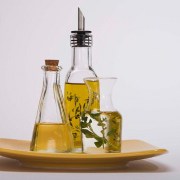 Photo: Getty Images
Photo: Getty Images
In my house we have two kinds of oil—olive oil and vegetable oil. We use the veggie oil for Indian cooking and the olive oil for everything else. I'm often overwhelmed at the dozens of cooking oils found at grocery stores and never really know how to decipher a canola from a safflower. Here's a quick peek at some of the most popular oils out there and the best ways to use them in your kitchen:
Olive Oil: Olive oil is one of the most-used oils in American kitchens and the only oil used in Mediterranean kitchens. It's light and delicate in flavor and brimming with heart-healthy health benefits. It's a great oil for salad dressing, bread dipping and sautéing due to its relatively low smoke point.
Rice Bran Oil: Rice bran oil is obtained from the inner husk of a grain of rice. Its high smoke point and mild flavor make it perfect for stir frying and deep-frying. Popular in Japanese and Chinese food, its often used in making tempura. Due to its low levels of monounsaturated fat and cholesterol-fighting vitamins, it's considered one of the healthiest cooking oils available.
Canola Oil: Canola oil is low in saturated fat, high in monounsaturated fat, and full of omega-3 fatty acids making it a heart health cooking aid. It has one of the lowest smoke points of all the cooking oil. Canola oil is relatively flavorless, making it an ideal choice for baking.
Peanut Oil: Peanut oil is a staple in Asian cooking. Its high smoke point makes it ideal for frying especially dishes like french fries and chicken. Its natural nutty flavor make it a tasty addition to numerous Asian-inspired dishes.
Soybean Oil: Soybean oil is a popular type of vegetable oil derived from soybeans.
It's lower in monounsaturated fat than olive oil and has a relatively high smoke point. Soybean oil is popularly used for frying, baking and to top salads.
Sunflower Oil: Sunflower Oil is low in saturated fat and high in vitamin E. Its widely recognized health benefits have encouraged food producers to use it in the production of numerous snack foods including potato chips. At home, it's great for cooking, frying, and topping salads.
Remember: Oils are best kept when stored in a dark, dry place. Most oils will keep for around one year. Remember that the best way to discard oil is to throw it in the garbage, never down the sink.





Add a Comment1 Comments
Good article. I think you should have also explained where peanut oil stands from a heart healthy perspective. Many people are trying to eliminate saturated fats to reduce their triglyceride levels as referenced below:
http://www.diettolowertriglycerides.com
April 26, 2011 - 7:34amThis Comment